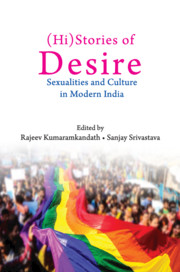Book contents
- Frontmatter
- Contents
- List of Images
- Acknowledgements
- Introduction: Sexuality and Sexualities
- 1 Politics of Prop Roots: Beyond ‘The Repressive Hypothesis’
- 2 Of Identities and Other Desires: Thinking about Sexualities
- 3 The Stuttered Process of Subject Formation: A Sex Worker's Experiments with Narration
- 4 Sexual Realism? (Hetero)Sexual Excess and the Birth of Obscenity in Malayalam Literature
- 5 Sexualizing Kālā Pāni
- 6 Memories of a Queer Sexuality: Revisiting Two ‘Toto’ Folk Tales
- 7 Learning about Sex in Mumbai: Rethinking the ‘Knowledge Gap’ Debate in Sexuality Education
- 8 Family Planning and the Masculinity of Nirodh Condoms in India
- 9 Women and Their Bodies: Menstrual Celebrations and Construction of Sexuality in Assam
- 10 Tanjai Prakash: Between Desire and Labour
- 11 Hijra Intimacies and Inheritances
- Notes on Editors and Contributors
- Index
11 - Hijra Intimacies and Inheritances
Published online by Cambridge University Press: 24 December 2019
- Frontmatter
- Contents
- List of Images
- Acknowledgements
- Introduction: Sexuality and Sexualities
- 1 Politics of Prop Roots: Beyond ‘The Repressive Hypothesis’
- 2 Of Identities and Other Desires: Thinking about Sexualities
- 3 The Stuttered Process of Subject Formation: A Sex Worker's Experiments with Narration
- 4 Sexual Realism? (Hetero)Sexual Excess and the Birth of Obscenity in Malayalam Literature
- 5 Sexualizing Kālā Pāni
- 6 Memories of a Queer Sexuality: Revisiting Two ‘Toto’ Folk Tales
- 7 Learning about Sex in Mumbai: Rethinking the ‘Knowledge Gap’ Debate in Sexuality Education
- 8 Family Planning and the Masculinity of Nirodh Condoms in India
- 9 Women and Their Bodies: Menstrual Celebrations and Construction of Sexuality in Assam
- 10 Tanjai Prakash: Between Desire and Labour
- 11 Hijra Intimacies and Inheritances
- Notes on Editors and Contributors
- Index
Summary
In a judgment delivered on 18 September 1989 before the Madhya Pradesh High Court in a case of disputed property between Illyas and Others versus Badshah alias Kamla, Justice G. C. Gupta dismissed an appeal for a hijra/ eunuch's property by Muslim kin who did not belong to the guru–chela system of the indigenous transgender community to which the deceased belonged. The order read:
The learned trial Judge, on the basis of evidence adduced by the parties, held that there was a custom among eunuchs under which the property of a eunuch could be transferred only to another eunuch of the community and not to a person outside the community. The learned trial Judge further held that guru-chela system was prevalent amongst eunuchs under which the property in the hands of Guru was inherited by Chela. On these findings he held that the will dated 28-11-1956 (Ex. D/1) was illegal and void. That is how the suit was allowed and declaration given. (www.indiankanoon.org/doc/490695/n.d)
This judgment that endorses an adopted kinship among the hijras f lies in the face of regular inheritance laws based on family/blood ties, as well as challenges religious (Hindu or Muslim) customs in India.
Sexuality, Kinship, Finance
I want to think here about patterns of kinship, intimacy, and public sexualities in hijra ‘families’ in India in the context of financial transactions and anxieties that determine or transform the ways in which such tenuous and sometimes provisional relationships are lived. I will begin by re-visiting the guru–chela equation in the transgender gharana system in light of three ‘events’ or markers: first, the then Delhi Chief Minister's announcement of monetary compensation for the ‘next of kin’ of the dead in a fire incident at a eunuchs’ convention in the capital in 2011; second, a Government of India directive (announced in September 2012) that would allow a new option for registering voters in the electoral rolls, with ‘guru’ as an option to ‘parents’ and ‘chela’ added to ‘son/ daughter’ in recognition of nomenclatures of relationships in the eunuch community; third, what has been hailed as a ‘landmark judgment’ from the Supreme Court of India in April 2014, an order formally granting recognition to ‘the transgender community’ as a ‘third gender’ to be treated as a separate category for consideration in educational institutions and workplaces under the rubric of ‘Other Backward Classes’ (OBC).
- Type
- Chapter
- Information
- (Hi)Stories of DesireSexualities and Culture in Modern India, pp. 189 - 206Publisher: Cambridge University PressPrint publication year: 2020
- 2
- Cited by



